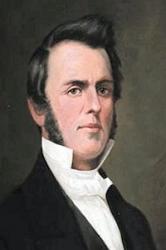
1820 - 1893 Hymnal Number: 541 Author of "I shall not want: in deserts wild" in Hymn and Tune Book of the Methodist Episcopal Church, South (Round Note Ed.) Born: December 4, 1820, Baltimore, Maryland.
Died: November 18, 1893, Staten Island, New York.
Buried: Moravian Cemetery, New Dorp, New York.
Grandson of a Methodist minister, Deems began preaching temperance at the tender age of 13. He studied at Dickinson College, Carlisle, Pennsylvania, intending to become a lawyer. Instead, after graduating in 1839, became a Methodist minister in Asbury, New Jersey. The next year, he began working for the American Bible Society of North Carolina, and later became a professor of logic and rhetoric at the University of North Carolina (1842-48). In 1849, he taught natural sciences at Randolph-Macon College, Ashland, Virginia for a year, then began pastoring a Methodist congregation in New Berne, North Carolina. Shortly thereafter, he became president of the Women’s College in Greensboro, North Carolina, serving until 1854, when he returned to New Berne. After the American civil war, he moved to New York City, where he edited The Watchman newspaper and founded the Church of Strangers, helped in part by a large grant from Cornelius Vanderbilt. He also influenced Vanderbilt’s decision to contribute a million dollars to the Central University of the Methodist Episcopal Church, South (now Vanderbilt University). Deems’ works include:
Hymns for All Christians, 1869 (compiled with Phoebe Cary)
Scotch Verdict in re Evolution, 1885
--www.hymntime.com/tch
Charles Force Deems


 My Starred Hymns
My Starred Hymns





